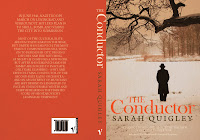I know it seems contrary but often when an author wins a major literary award it puts me off reading them. I fear the work is going to be too dense and desperately highbrow, designed to please judges rather than ordinary readers like me.
Geraldine Brooks won a Pulitzer in 2006 for her novel March but I decided not to hold that against her and I’m glad as her latest novel, Caleb’s Crossing (Fourth Estate, $39.99) is a brilliant read.
The Australian-born author has taken a little known piece of history and turned it into a fascinating piece of fiction. Set mostly on the island of Martha’s Vineyard where Brooks now lives for part of the time, the story is inspired by the life of Caleb Cheeshahteamuk, the first Native American to graduate from Harvard College back in the 1660s. When she began her research Brooks found records of him scarce and so has used her novelist’s skill to imagine what it must have been like to be plucked from a traditional life in the wilderness and schooled in the classics as he was.
The story is narrated by a spirited and quietly rebellious girl called Bethia Mayfield who is a minister’s daughter growing up in an English Puritan settlement on the island. Her life is one of hard work and heartache. As a female she is not offered anything more than the most basic education although she thirsts for knowledge and listens to her brother’s lessons whenever she is able. “Women are not made like men,” her father tells her. “You risk addling your brain by thinking on matters that need not concern you…It is not seemly for a wife to know more than her husband.”
One day while Bethia is out searching for shellfish she encounters a young native Wampanoag Indian who shows her a better hunting spot. The pair go on to form a bond, run wild together over the island and Bethia starts to try to convert this “salvage” as they are commonly known, to her own religion and teach him English.
What she begins her father continues believing that, once educated, Caleb will help tame the rest of his people and break the power of their spiritual leaders the pawaaws. Soon Caleb is in Cambridge studying amidst the colonial elite and Bethia too is there but her fate is quite a different one.
Although set centuries go there is much here that will resonate with the modern reader - the way English settlers buy land from Indians who don’t share their concept of ownership, the racial prejudice and greed, the drive to force everyone into a single way of thinking, the narrow-minded view of women. While Caleb may have been the inspiration for this novel Bethia is its triumph and the way she manages to make a life within the constrictions of her era is the real meat of the story. Her voice and the language she uses seem completely of the time and credible.
So yes Brooks has a Pulitzer to her name but that doesn’t mean Caleb’s Crossing is inaccessible, dry or pretentious in any way. If you love historical fiction then you will warm to this book. It is written with suppleness and grace, wears its research lightly and at heart is a beautiful love story. Whether Caleb’s Crossing is destined to win prizes I’m not sure but it ought to win Brooks many more fans.
Nicky Pellegrino
Sarah Quigley is a novelist, poet and critic whose latest book, The Conductor (Vintage, $39.99) is currently on the NZ fiction bestseller list. Footnote:
Nicky Pellegrino is a succcesful Auckland-based author of popular fiction, The Italian Wedding was published in May 2009, Recipe for Lifewas published in April, 2010, while her latestThe Villa Girls, was published in April this year.
She is also the Books Editor of the Herald on Sunday where the above review was first published on 12 June, 2011 as was the Booklover column below:
Nicky Pellegrino is a succcesful Auckland-based author of popular fiction, The Italian Wedding was published in May 2009, Recipe for Lifewas published in April, 2010, while her latestThe Villa Girls, was published in April this year.
She is also the Books Editor of the Herald on Sunday where the above review was first published on 12 June, 2011 as was the Booklover column below:
Booklover - Sarah Quigley
The book I love most is…....... The Book of Disquiet, by the Portuguese writer Fernando Pessoa. He was almost unknown in his lifetime but after he died in 1935 a trunk was found containing thousands of poems, letters and journals. This book is a selection of those: a semi-fictional diary almost like a novel. I read it very slowly, over about a year, so it felt like dreaming. It’s beautiful, poetic, and memorable. The best translation I’ve come across is by Margaret Jull Costa.
The book I’m reading right now is…............. Poles Apart, by Gareth Morgan and John McCrystal, about climate change. It’s topical, incisive, and accessibly written.
The book I’d like to read next is…...... a collection of Chekhov’s letters, sitting half-read on my breakfast table. I’ve been travelling for the past month and had to leave it behind, so I’m looking forward to getting back into it. The letters reveal an intelligence and humour that feel incredibly modern, in spite of being written over a hundred years ago.
The book I wish I’d never read is..............… Stephen King’s On Writing. I kept reading hoping it was going to get more interesting and less self-regarding, but it never did. When I finished I left it in a rubbish bin at Heathrow!












No comments:
Post a Comment